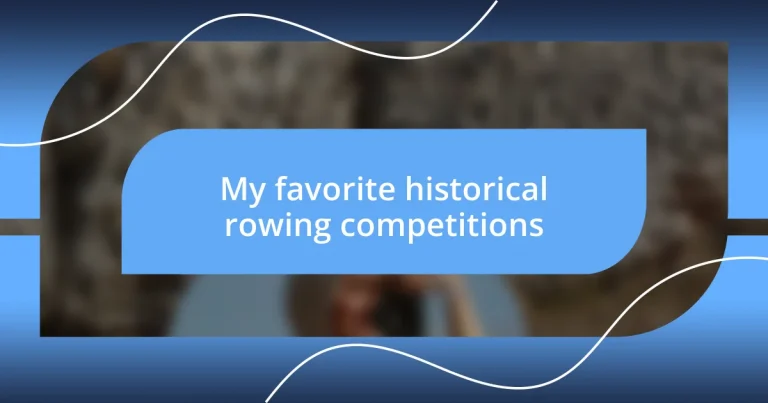Key takeaways:
- Rowing competitions date back to ancient Egypt (500 BC) and evolved into organized events in the 19th century, with significant events like the Oxford-Cambridge Boat Race solidifying its cultural importance.
- Iconic competitions such as the Henley Royal Regatta (1839), Head of the Charles Regatta (1965), and Olympic Games rowing (since 1900) showcase historical significance and intense rivalries among elite rowers.
- Notable achievements include the victory of the U.S. women’s eight at the 1996 Olympics, the British women’s eight in 2012, and the German men’s coxless four in 1996, highlighting pivotal moments that inspired future generations of rowers.

Overview of historical rowing competitions
Rowing competitions have ancient roots, tracing back to at least 500 BC in Egypt, where they were held as a demonstration of strength and skill. I find it fascinating to think about what it must have been like for those early competitors, their hearts racing as they propelled sleek vessels across the water, driven by the desire to outpace one another. Can you imagine the energy and excitement that filled the air with each rower pulling in unison?
Fast forward to the 19th century, and rowing transformed into a highly organized sport, particularly in England and the United States. Events like the Oxford-Cambridge Boat Race captured the public’s imagination, sparking intense rivalries that still resonate today. I can almost hear the cheers and see the tension as those crews paddled against powerful currents, representing not just themselves but their entire universities.
As I dive deeper into the world of rowing history, I’m struck by the camaraderie and community that has always surrounded these competitions. The shared experience of training, competing, and sometimes losing binds rowers together in a way that few other sports can. Reflecting on these elements brings to light a crucial question: what draws us to these time-honored events? It seems to me that it’s the blend of rivalry, teamwork, and the sheer beauty of the sport that keeps us captivated, generation after generation.

Famous competitions in rowing history
There are a few competitions in rowing history that truly stand out. The Henley Royal Regatta, established in 1839 on the Thames River, is one such event that has garnered prestige over the years. I remember watching the regatta as a young enthusiast and feeling a wave of awe at the beautiful boats, the excitement of tight races, and the elegance of the spectators dressed in their finest attire. The atmosphere was brimming with tradition and anticipation, reminding me of a classic sporting event that has continued to capture hearts and inspire aspiring rowers.
Another iconic event is the Head of the Charles Regatta, which began in 1965 and quickly established itself as the largest two-day regatta in the world. I recall the sheer number of competitors and the incredible spirit that filled the air. Rows of boats lined the banks of the Charles River in Boston, creating a vibrant scene that felt electric. This competition not only showcases elite athletes but also brings together a community of rowers of all levels, fostering a unique sense of belonging and shared passion.
I can’t overlook the significance of the Olympic Games in the realm of rowing. This global platform has witnessed legendary competitions and intense rivalries since its inclusion in 1900. The first time I watched the Olympics, I was hooked on the drama of the finals. Nations come together, and the stakes are high, and each stroke is a testament to tireless training and dedication. It’s a celebration of athletic prowess, underscored by the collective pride each rower carries as they represent their country.
| Competition | Year Established |
|---|---|
| Henley Royal Regatta | 1839 |
| Head of the Charles Regatta | 1965 |
| Olympic Games Rowing | 1900 |

Legendary races and their stories
The stories behind legendary races often resonate far beyond the water. One of my favorites is the epic clash between the American and British crews during the 1952 Olympics in Helsinki. The tension was palpable as the two teams battled for supremacy, but what struck me most was the backstory of the American team. They were a mix of backgrounds, united by sheer determination and a dream to outperform a seemingly unbeatable rival. I can still vividly recall that final stretch—each stroke pulling them closer to victory. Witnessing the raw emotion of their win, tears flowed freely among rowers and spectators alike, a reminder that sometimes, it’s about so much more than just competition.
- The 1975 Henley Royal Regatta saw a memorable race between the English and Australian teams, where the intense rivalry forced competitors to paddle harder than ever before.
- During the 1996 Atlanta Olympics, the U.S. women’s eight overcame immense pressure and clinched gold, a moment that echo with pride and newfound possibilities for female athletes worldwide.
- The 2000 Sydney Olympics introduced some thrilling strategies as the Dutch men’s quadruple scull team secured their first gold, marking a pivotal moment that reshaped the sport’s competitive landscape.
Each of these iconic moments reveals not just the sport’s exhilarating nature, but also the countless stories of heart and resilience behind every stroke.

Notable teams and their achievements
When thinking about notable teams in rowing, the University of California, Berkeley stands out prominently. Their men’s crew has claimed numerous national titles and consistently ranks among the best in collegiate rowing. I remember hearing stories from alumni about their intense training sessions, and it always amazed me how much dedication they put into those early morning practices to earn their spot on the team. Their relentless pursuit of excellence reflects not just a competition for medals, but a deep-seated legacy that inspires future generations.
Another team that has profoundly impacted the sport is the British women’s eight. During the 2012 London Olympics, they achieved an outstanding victory that ignited a wave of enthusiasm for women’s rowing globally. I can still picture the emotion pouring from them as they crossed the finish line, realizing they had not only won gold but had also carved a significant mark in history. How often do we see teams not just competing but also breaking barriers and redefining what’s possible? That triumph resonated with so many aspiring female athletes, showing them that anything is achievable.
Lastly, let’s not forget the German men’s coxless four, who showcased their brilliance at the 1996 Atlanta Olympics. They managed to pull off an unexpected win, utilizing strategy and synchronization that left many astonished. I think about their training regimen—the countless hours spent refining each stroke and working as one unit. It really makes you appreciate the art of teamwork in rowing. Each member’s contribution is vital, underscoring the notion that in this sport, victory is a collective journey rather than just an individual quest for glory.

Future of historical rowing events
As I look to the future of historical rowing events, I can’t help but feel a sense of excitement. Rowing has a way of evolving while still honoring its traditions. With emerging technologies in boat design and training methods, could we witness a resurgence of interest in classic races? Events like the Henley Royal Regatta might see innovative formats that incorporate new techniques while preserving their rich narratives, offering a fresh perspective on old rivalries.
Moreover, increased attention to inclusivity might redefine the landscape of these competitions. Just imagine the impact of having more diverse teams sharing their unique stories and cultural backgrounds in global events. I believe that this push for diversity could resonate deeply, allowing fans to connect more personally with each race. Perhaps we’ll have the chance to witness underrepresented voices capturing the spirit of historical competitions in the years to come.
Looking ahead, it’s also worth considering how technology will influence the storytelling aspect of rowing events. Interactive platforms and virtual experiences could allow fans to engage with the emotional journeys of rowers in real time. It reminds me of how transformative those moments can be—beyond the finish line, it’s the shared experiences and camaraderie that truly make the sport special. I can’t help but wonder, what stories will future generations tell about their rowing journeys? Each stroke, each race, could become a part of a larger narrative that continues to inspire.














